On July 30, 1942, in the middle of WWII, President Franklin D. Roosevelt signed Public Law 689, creating the Women’s Navy Reserve. The intent of the new law was to “expedite the war effort by releasing officers and men for duty at sea …” The WAVES, as they were called (Women Accepted for Volunteer Emergency Service) did not go out to sea or serve on the frontlines. Instead, many of them took over positions men had held on the homefront, freeing them up for active combat.
The moment she heard about the WAVES, Leona Bright Chasse, who lived in Cornish, Maine and had graduated from Cornish High School the year before, knew she wanted to enlist.
I wanted to help in the war. You didn’t ask. It was the right thing to do.
Leona Chasse, WWII Veteran
Only she wasn’t old enough. Boys could be 18 when they enlisted, but girls had to be 20. Leona wasn’t happy, but she didn’t wallow in her disappointment. Instead, she got a job.
There was a factory in Limerick, nine miles away, that made yarn to go into blankets and uniforms and whatever else was needed for military people. I went on a little putput bus. Of course, the gasoline was rationed, tires were rationed, et cetera. It used to do a round robin between Limerick and Parsonsfield and Cornish. My mother and I both worked in there.
Leona Chasse
A short time later, she and her mother moved to Quoddy Village in Eastport. In the late 30s and early 40s, the National Youth Administration used Quoddy Village to provide vocational training to young people. It was part of the Works Progress Administration (WPA) started by President Roosevelt. Leona studied communications.
She didn’t stay long at Quoddy Village. On January 4th, 1944 she turned 20 and on January 5th, Leona Chasse was a WAVE in the Navy.
She went to boot camp at Hunter College in New York and after graduation, was given two options. The first was that she could attend a school in Dayton, Ohio to learn how to make a machine called a bombe. At the time, she didn’t know that a bombe was a huge mechanical device the Army and Navy were using to crack codes sent by German and Japanese armies.
She did know that she wasn’t interested in learning how to build or repair any kind of machine. She wanted to work in communications. Her request was granted.
They let me choose and I went to the Naval Communications Annex out by the Naval Observatory in Washington, DC. The WAVES were in Barracks D across the street within walking distance and it had two check points. It was not unlike a prison. It had low brick buildings and a chapel. I remember that chapel because we went over one morning, we marched everywhere by the way, and we had a lecture. They said this is secret.
Leona and the other WAVES learned that if they told anybody anything about the work they were doing, they would be in big trouble and they would be treated just like a man would.
She said it was hard being only 20 years old and having to carry such a burden of secrecy. As for the work she did, she said it was so easy it could have been done by anyone. What she didn’t realize until decades later is that as easy as it might have been, her job played a critical role in bringing an end to World War II.
The above picture is from a newspaper clipping. It’s not a picture of Leona, but it could have been. That big mechanical device is a bombe. Near the top are two rows of disks. Leona’s job was to set and reset the disks on the bombe she was assigned to work on at the Naval Communications Annex.
There were metal disks just about the size of your hand and there were a number of them on the machine. We were handed a strip of paper to set these disks on the machine and apparently somebody ran through a tape, a long tape with all this code on it that came from the Enigma machine that the Germans were making their code on. I believe there was another area where girls and even civilians, civilian men, sat down to work on the code.
Leona Chasse
Leona was one of about ten thousand women who were secretly recruited by the U.S. Army and Navy and sent to D.C. to work on the bombes. Liza Mundy wrote a book about these women in 2017 called the Code Girls. Details of what the Code Girls did had been kept secret for nearly 70 years but they were laid wide open in Mundy’s book.
The Code Girls helped crack encrypted messages that the German and Japanese armed forces sent during World War Two. And instead of spending long hours trying to break the codes totally by hand, the bombe sped things up enormously. Kind of like a computer but not exactly.
The Germans would set up a whole new code and then the Code Girls and others would decipher it and it wouldn’t be any good to the Germans. And then we could open up the sea lanes and let the convoys and single ships through. They would set another one up and we would decipher it and make it no good to them. The same thing happened over and over again. And then the war did end.
Leona Chasse.
World War II ended in Europe in the spring of 1945. Leona could have been discharged and gone home. Instead, she took an assignment in Pearl Harbor and worked on breaking Japanese codes.
The reason I took it was I thought it could bring a young man with a family home as an early out at the end of the war and he could end his war earlier than that. And of course, who’s going to resist Hawaii?
Leona Chasse
Recognize what’s in the above picture? It’s a coconut. Leona sent it from Hawaii to her mother. She wrote the name and address with nail polish. That and her Navy uniform are prized possessions.
After the Japanese formally surrendered in early September 1945, Leona returned home to Cornish, Maine. To absolutely no fanfare.
And we went all those years without any recognition for what we did. People in World War Two didn’t go home with bells and whistles and all kinds of praise. We didn’t talk about our duty. Even the men didn’t talk. I just got off the train like I’d been to Boston one night. And that was it for me. Just like a train trip. I had long since I put it away. It had happened in my life and I’m very proud. But that’s it.
Leona Chasse
But now that what the Code Girls did during WWII is no longer top-secret, they are getting the recognition they deserve. Like so many WWII veterans, many have passed away. Leona, who will be 96 in January, says no more secrets has brought her new life. She enjoys researching and reading about the Code Girls and talking about her own experiences.
When she returned home after the war, no one even bothered to ask what she had done. She thinks most people assumed she was a clerk and that’s what she would have told them. But, now she’s proud to say she was a Code Girl.
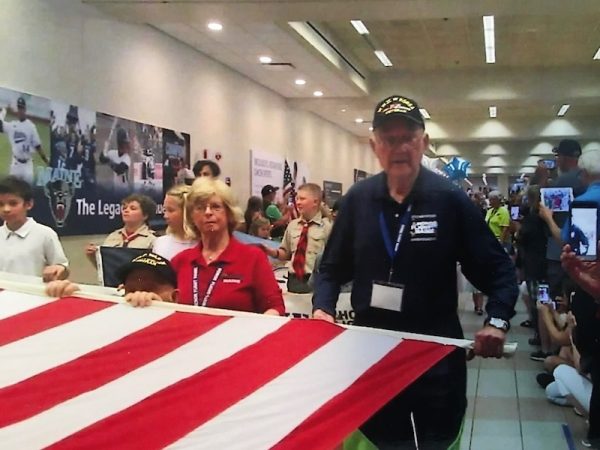
This past June she and a friend attended a Welcome Home ceremony for a group of Veterans who were returning from an Honor Flight to Washington, D.C. She had hoped to make the trip herself, but couldn’t because of some health issues. Still, being among the throng of people welcoming home other veterans was an incredible experience for her.
The people were lined up. When the veterans get off the airplane there were two lines and they made a parade. One line is for the public and in the other there were the Coast Guard and the Flag Ladies, and some officials from Honor Flight Maine and some veterans — they wheeled them down in their wheelchairs.
Leona Chasse
Leona wasn’t part of the parade, she was watching from the sidelines, but she certainly got her fair share of attention.
As soon as they found out I was a World War Two veteran they showered me with stuff and favors. I could have bought the world that day. People were giving me cards, calling cards that said thank you for your service. And out of the crowd comes this little boy, probably about eight. He said he wanted to shake my hand but that isn’t the kicker. He said thank you for your service and then his little sister popped up, not to be outdone. She took my hand, I can still feel that little hand in mine. I was so surprised and it was so joyous.
Leona Chasse
Leona couldn’t make the trip to DC this past summer, but an Honor Flight is on her calendar for this spring. And one of the things she’s looking forward to most is having her picture taken at the Smithsonian standing in front of a bombe.
Thank you for your service, Leona Bright Chasse, former WAVE and a veteran of World War II.
Thank you for your service all veterans, including my dad, the late Lt. Col. Robert Swett, who fought in Korea and served two tours of duty in Viet Nam.
You’ll find information about Honor Flight Maine on its website.
If you’d like to know about Leona, listen to the Conversations About Aging podcast episode we recorded last summer. You’ll also find a full transcript if you’d prefer to read rather than listen.

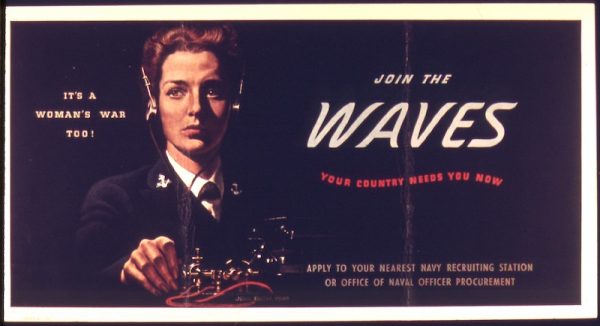
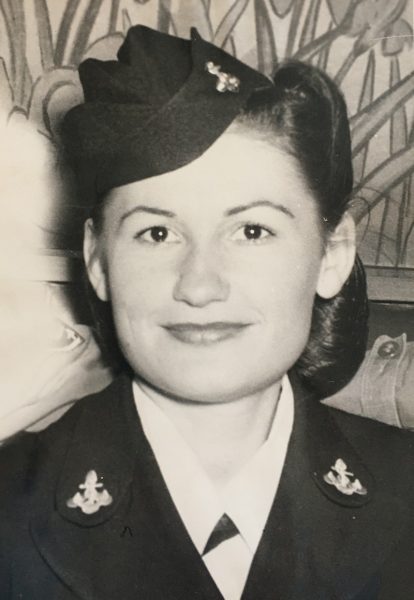
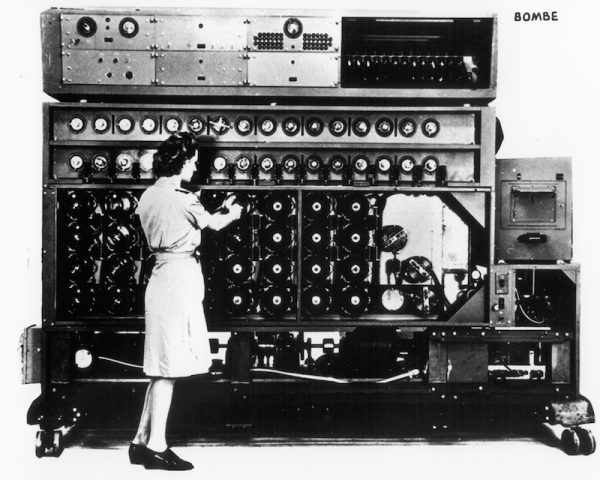
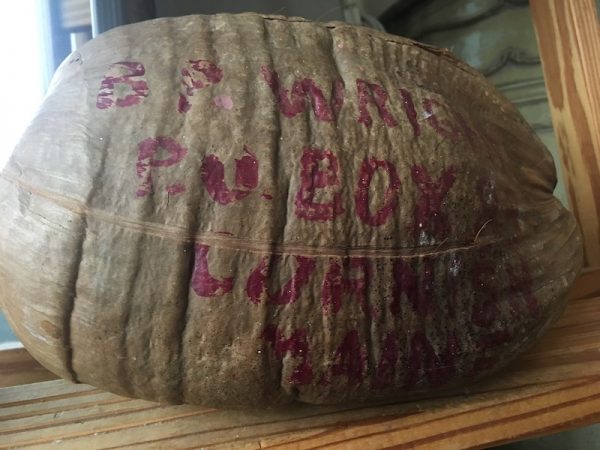
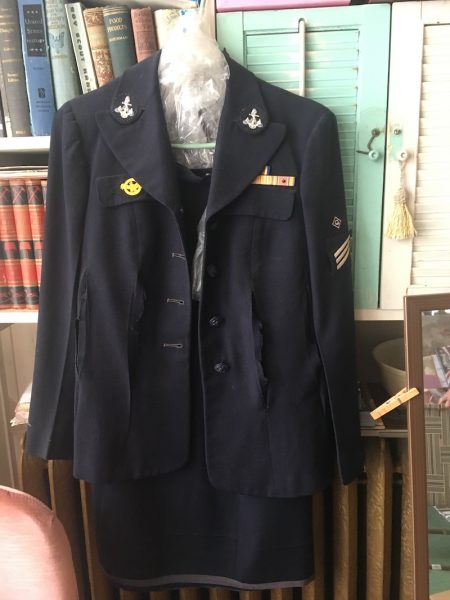
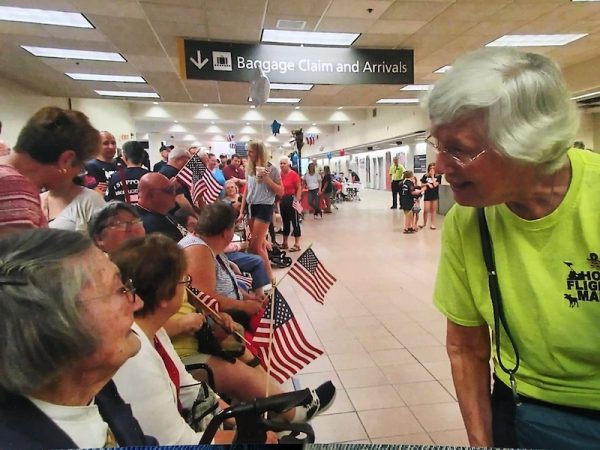
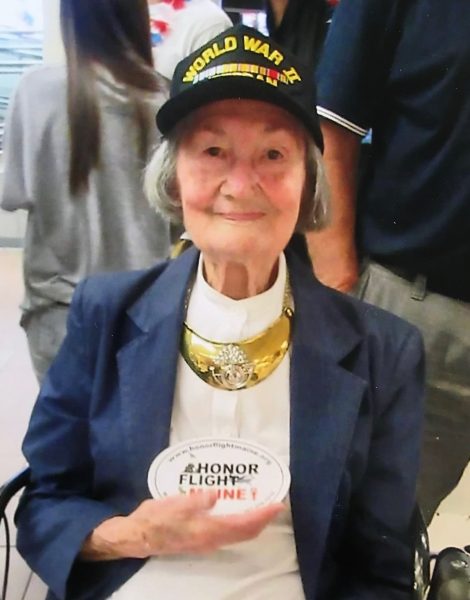
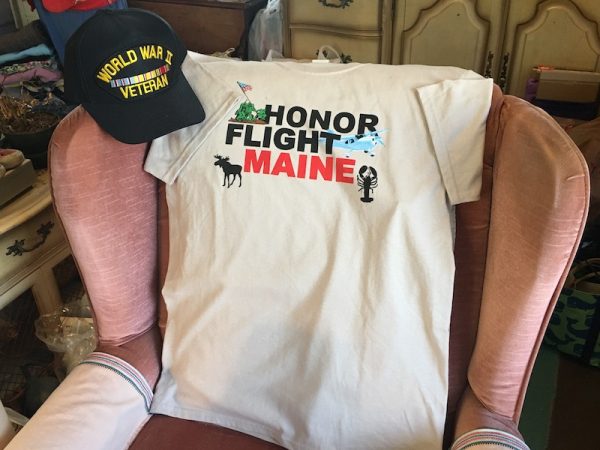
Diane,
Thank you for honoring the often forgotten military service of women!! Ms. Chase you are an American heroine!!
Such an incredible story about the Code Girls! it is about time Leona and the other women get the recognition they deserve. It is a proud moment for all of us here in the Great State of Maine. Thank you Leona and all veterans of any war or other duty they may have served. Thank you for keeping us safe too. God bless and keep you and enjoy your trip next spring.
Leona worked as a clerk in the Cornish Post Office (04020) A more pleasant and unassuming person would be hard to find. And no, she never let on.